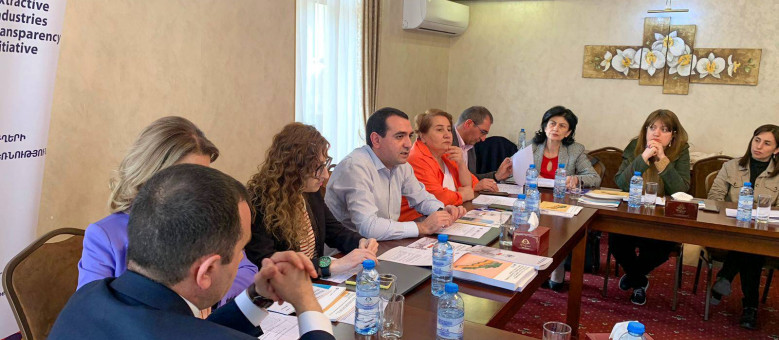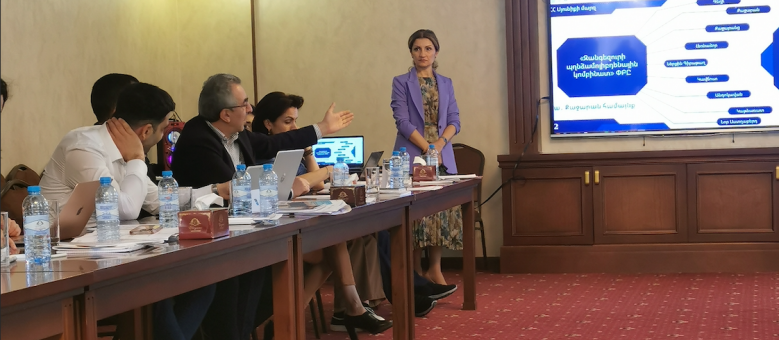A Three-Day Training-Workshop in Tsaghkadzor on the Royalty Allocations to Community Budgets

With the support of The World Bank's "Support to EITI Armenia" grant project and in cooperation with the Ministry of Territorial Administration and Infrastructure of RA, the Extractive Industries Transparency Initiative (EITI) Secretariat of Armenia organized a three-day training-workshop on "Capacity building for communities to develop effective programs and implement them at the expense of the royalty allocations to community budgets" on May 4-6 in Tsaghkadzor.
Taking into account the amendments made to Law HO-52-N "On the Budget System of RA" and to Law HO-53-N "On Local Self-Government" dated March 4, 2022, as well as given the sub-legislative acts adopted to ensure their execution, the aim of the training was to develop and strengthen the capacities and skills of the relevant employees of the state bodies and the communities receiving contributions from royalties.
About 40 representatives from the RA Prime Minister's Office, authorized state bodies, municipalities, affected communities, and the EITI Multi-stakeholder group participated in the workshop.
The training-workshop was organized in an interactive way, which is already typical of EITI trainings, ensuring the active performance of all participants. The workshop was launched with welcome speeches by Hovhannes Harutyunyan, TAI Deputy Minister, and Lusine Tovmasyan, Head of EITI national secretariat Armenia.
The topics included in the training agenda were presented by, and the attendee's questions - answered by Seda Hakobyan, Acting Head and chief specialist of the Division of Policy Development for Mining Industry of the Department of Subsoil, Ministry of Territorial Administration and Infrastructure of the RA, as well as by Naira Barseghyan, chief specialist, Armine Stepanyan, senior specialist, Eduard Baghdasaryan, chief specialist of the Analytical Methodology Division of the Department of Budget Process Coordination of the RA Ministry of Finance, Arthur Ghavalyan, Deputy Head of the Strategic Policy Department of the Ministry of Environment of the Republic of Armenia, and Hasmik Manukyan, EITI national Secretariat expert.
The participants also enjoyed the opportunity to listen to the feedback and remarks of Deputy Minister the coordinating the mining industry Hovhannes Harutyunyan regarding the topics under discussion and emerging issues.
The agenda topics included the mechanism of contributions to communities from the royalties paid by subsoil users and replenishment of municipal budgets; the preparation of socioeconomic programs of communities based on those contributions and the alignment of those programs with the authorized body; the directions of program activities; the accountability of program implementation; the importance of transparency and accountability in the preparation and implementation of programs from the perspective of the EITI Standard requirements.
The third day of the workshop was mainly about teamwork. Divided into groups, the participants were given a task to develop and present socioeconomic development programs of their community towards the directions of the set activities. The participants executed the task with keen interest, based on the information and knowledge gained during the first two days of the training. In the end, the participants selected the best of the presented programs by a general vote, with the representatives of the authorized bodies, and those of the EITI Multi-Stakeholder Group and The Secretariat providing their feedback on the programs.
Thus, the training-workshop was a good opportunity for community representatives to develop the knowledge and abilities necessary to prepare and implement socioeconomic programs, to study the importance of ensuring the transparency and accountability requirements of the EITI Standard, as well as to generate an inter-community network to exchange best practices. For the representatives of the authorized bodies, the discussions of the workshop provided an opportunity to record the gaps in the legal acts under execution and to subject them to further revision in order to clarify and facilitate the development and implementation of the programs as much as possible.

























